China's spicy hotpot sets its sights on global market
Source:China.org.cn Release time:2024/11/29
Hotpot, a beloved Chinese cuisine, is set to make a global impact as industry insiders and ingredient suppliers convened this week at the second China International Supply Chain Expo (CISCE) in Beijing to explore the future of the hotpot industry.
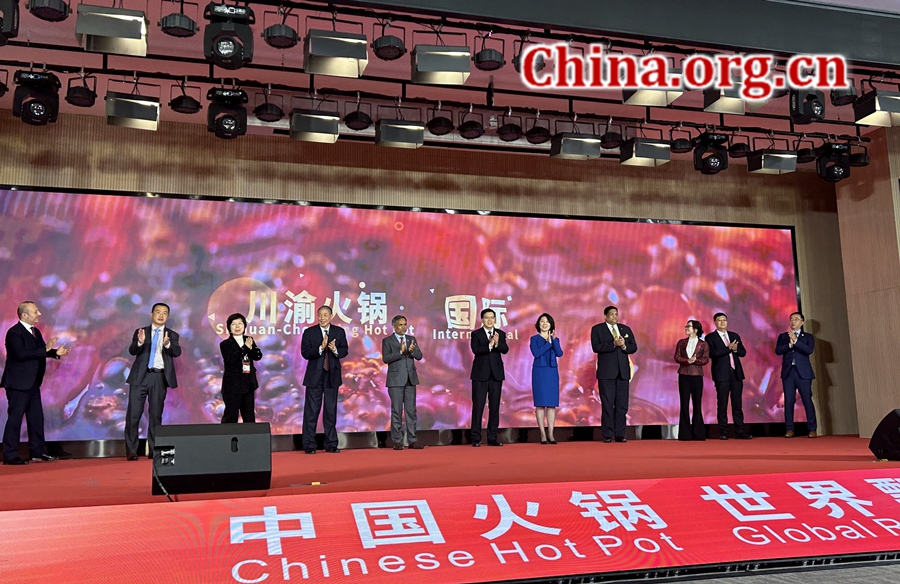
Officials and industry leaders launch the China (Sichuan-Chongqing) Hotpot Industry International Promotion Conference during the second China International Supply Chain Expo in Beijing, Nov. 26, 2024. [Photo/China.org.cn]
"The characteristics of hotpot — openness, inclusiveness and participation — make it ideal for global expansion and the universal values it represents," said Tang Qingshun, vice president of the Presidium of the China Cuisine Association (CCA) and founder and honorary president of the Hot Pot Committee of the CCA.
In China, people cherish this traditional cuisine, which involves gathering around a boiling pot that is typically spicy or filled with various soups or plain water. Diners add a selection of raw ingredients to the pot, enjoying them with different seasonings and spices while socializing with family, friends, colleagues, or business partners.
This year, renowned spicy hotpot companies from Sichuan and Chongqing came together to showcase their offerings in Beijing. According to Huang Li, president of the China Council for the Promotion of International Trade (CCPIT) Sichuan Council, the Sichuan-Chongqing Hotpot Industry Supply Chain Expo under CISCE's Green Agriculture chain section gathered 11 hotpot enterprises from Chongqing and 63 from Sichuan province.
"We want to highlight the achievements of the Sichuan-Chongqing hotpot industry and its supply chain. Our goal is to promote this culinary brand, which represents not only Sichuan and Chongqing but also China on the global stage. This initiative will further the overseas expansion of the hotpot industry and introduce international ingredients and spices to Sichuan and Chongqing, encouraging collaborative development within the industry," she said.
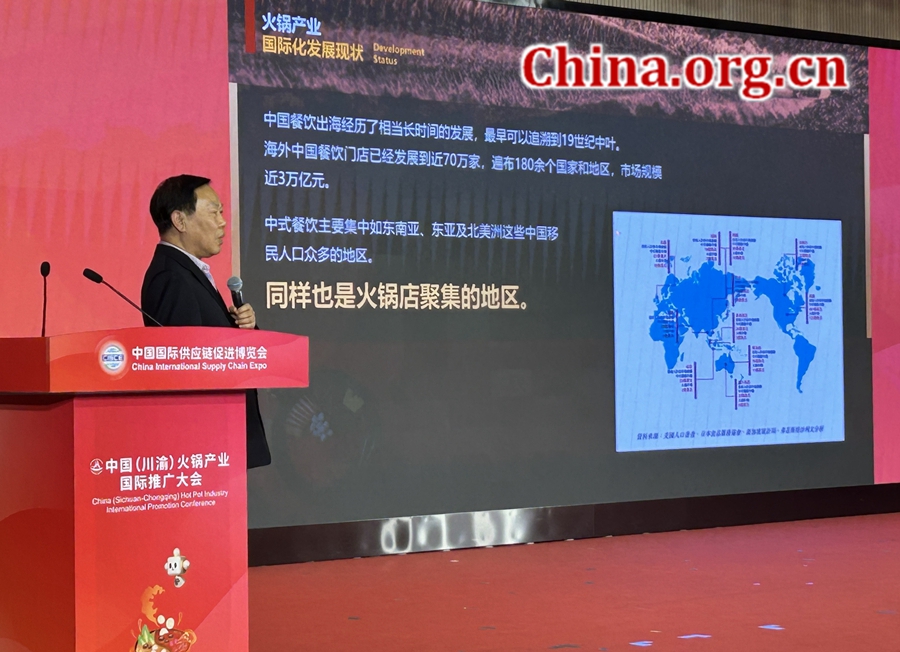
Tang Qingshun, vice president of the Presidium of the China Cuisine Association, introduces the development status of the hotpot industry at the China (Sichuan-Chongqing) Hotpot Industry International Promotion Conference during the second China International Supply Chain Expo in Beijing, Nov. 26, 2024. [Photo/China.org.cn]
The hotpot expo, the only themed exhibition at CISCE, spans 4,000 square meters and showcases the complete Sichuan-Chongqing hotpot industry chain, including product brands, supply chain enterprises and international suppliers. It features a variety of products, including condiments and ingredients at the beginning of the supply chain, base products and brands in the middle, and technologies for converting kitchen waste oil into biodiesel and bio-aviation fuel at the end.
In recent years, the Sichuan-Chongqing hotpot industry has accelerated its development and formed several industry clusters. According to a white paper compiled by Frost & Sullivan, a leader in growth advisory consulting, the market size of China's hotpot industry in 2023 exceeded 500 billion yuan ($69 billion), with the market share of Sichuan-Chongqing hotpot reaching 360 billion yuan, or as much as 66%. By the first half of 2024, approximately 206,000 outlets were serving Sichuan-Chongqing hotpot, consistently ranking first in the country.
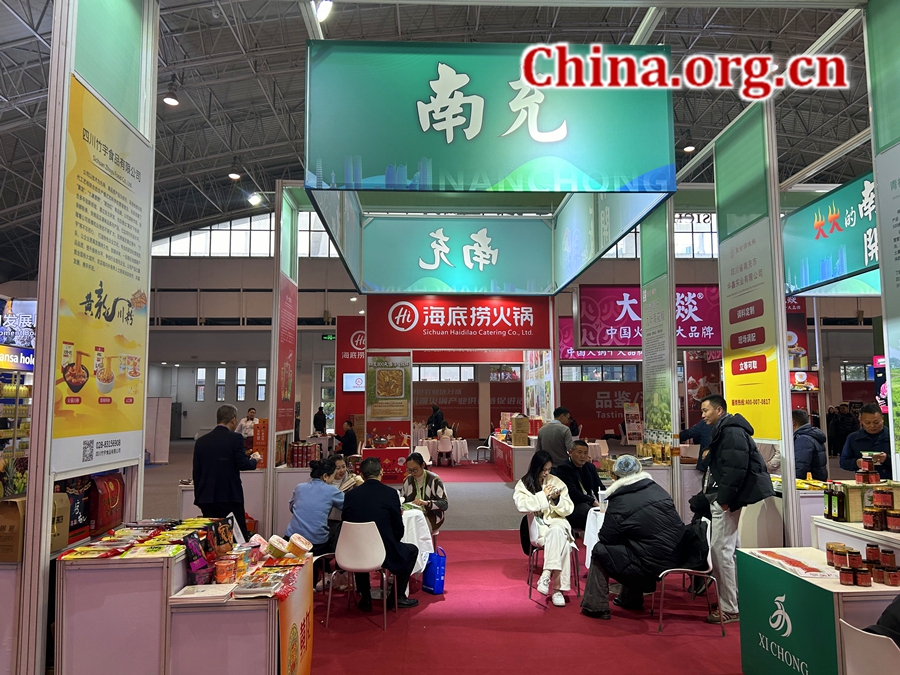
A photo shows booths at the Sichuan-Chongqing Hotpot Industry Supply Chain Expo during the second China International Supply Chain Expo in Beijing, Nov. 26, 2024. [Photo/China.org.cn]
"It's safe to say that hotpot plays a crucial role in stabilizing the economy, growth, and expectations for Sichuan, Chongqing, and the entire country," said Chen Guohua, president of the Chongqing Hotpot Industry Association.
Sichuan-Chongqing hotpot is expanding globally as a hallmark of China's culinary culture. Now available in over 80 countries, including the United States, Britain, and Japan, leading brands like Haidilao, Shoo Loong Kan Hot Pot, and Da Long Yi are driving its international growth. According to Frost & Sullivan, hotpot is a highly popular Chinese cuisine, with the international market size estimated at $41.4 billion this year and projections to reach $46.5 billion by 2026.
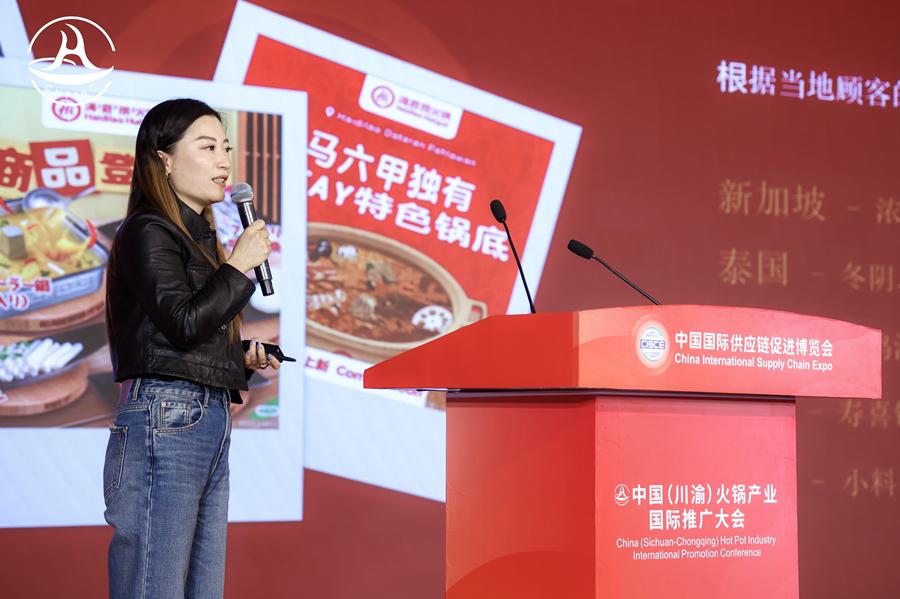
Huang Chaonan, deputy head of the Overseas Brand Development Department at Haidilao, speaks at the China (Sichuan-Chongqing) Hotpot Industry International Promotion Conference during the second China International Supply Chain Expo in Beijing, Nov. 26, 2024. [Photo courtesy of CCPIT]
"We have welcomed 1 billion visits from diners worldwide over three decades, covering different continents, and we opened our first restaurant in the UAE last year," said Huang Chaonan, deputy head of the Overseas Brand Development Department at Haidilao, which, as of September 2024, has 121 branches in 13 countries. She also shared key strategies that Haidilao has successfully implemented for its global expansion, including localized management, products and services, as well as ongoing technological innovations such as smart restaurants in Singapore.
Zhao Jiong, brand director of Shoo Loong Kan Hot Pot and CMO of the Brand Marketing Center at Renzhong Haihui Group, revealed that the company currently operates 44 restaurants and plans to open over 30 more across 24 countries. He emphasized that localization is crucial for doing business overseas, stating, "As part of the hotpot industry, we naturally embody Chinese culinary culture. In a way, going global isn't just about expanding our business; it's about sharing our culture with the world."
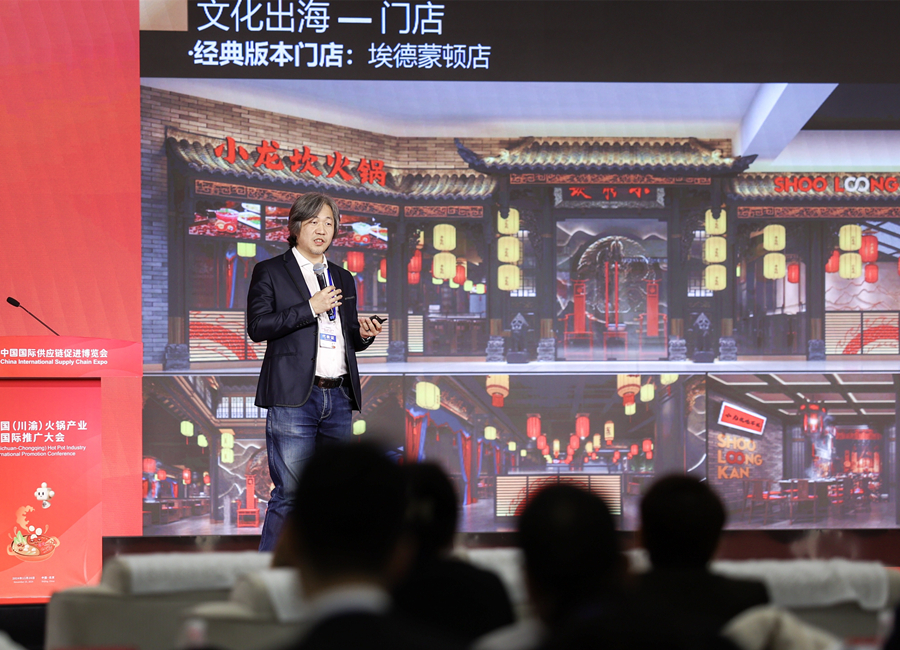
Zhao Jiong, brand director of Shoo Loong Kan Hot Pot, speaks at the China (Sichuan-Chongqing) Hotpot Industry International Promotion Conference during the second China International Supply Chain Expo in Beijing, Nov. 26, 2024. [Photo courtesy of CCPIT]
The China (Sichuan-Chongqing) Hotpot Industry International Promotion Conference was held on Nov. 26, bringing together industry insiders, experts, and business leaders to exchange ideas and experiences. During the panel discussion, they shared insights on exporting and importing raw food materials, ingredients, and spices, as well as strategies for meeting local standards and regulations in various countries.
Zuo Yongxiang, vice governor of Sichuan province, recognized the broader implications of the hotpot industry. "The global economic recovery faces numerous challenges, highlighting the need for strengthened cooperation in industrial and supply chains," he explained. "Hotpot, celebrated worldwide for its cultural allure and social appeal, drives a multi-channel supply of raw materials due to its diverse flavors and ingredients. Its quick cooking methods and varied consumption options facilitate rapid industrial deployment. Therefore, collaboration within the hotpot industry chain is crucial, influencing both economic growth and people's well-being, and serving as a striking microcosm of global industrial and supply chain cooperation."








